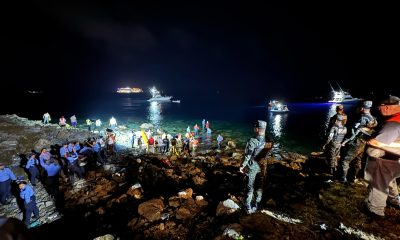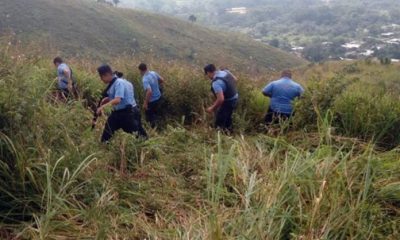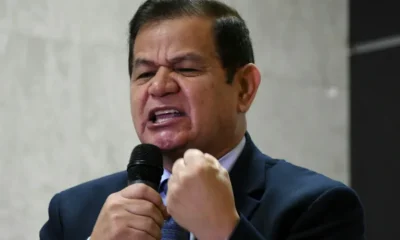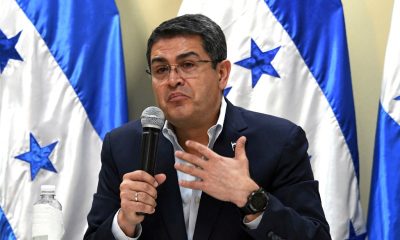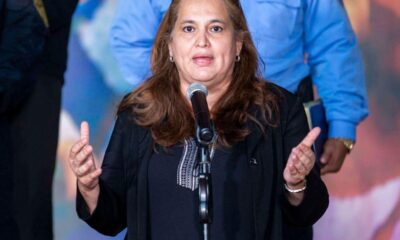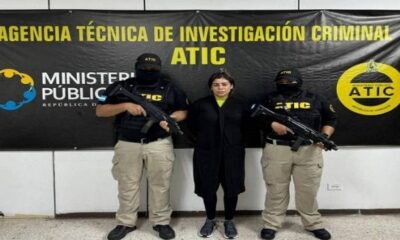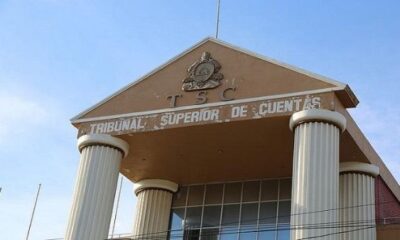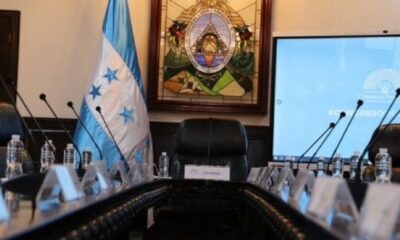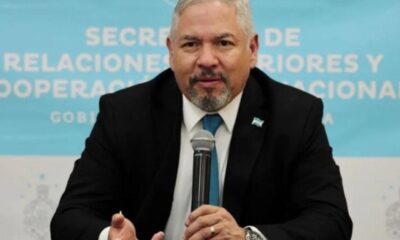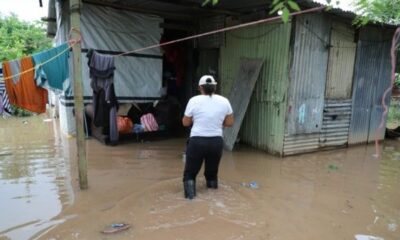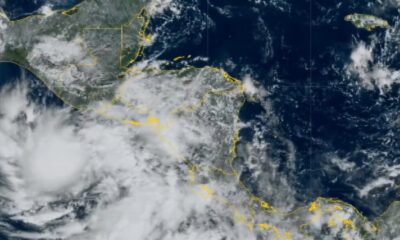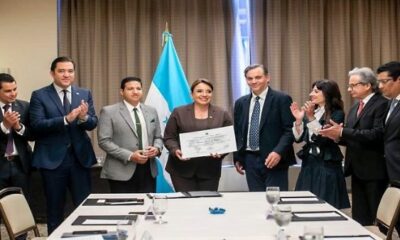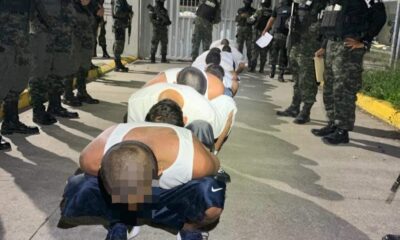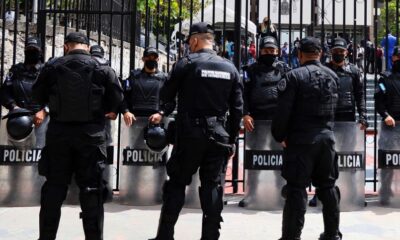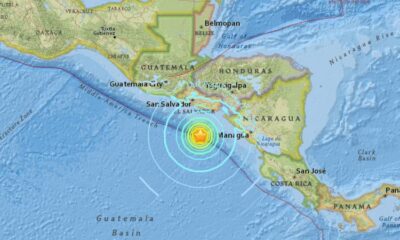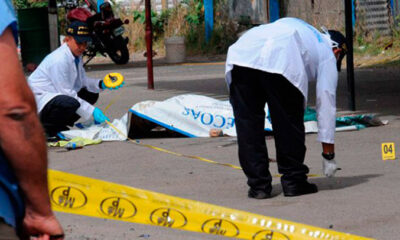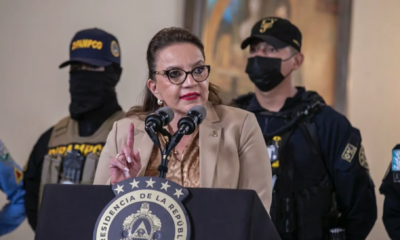Central America
Honduran President inaugurates Museum of Memory
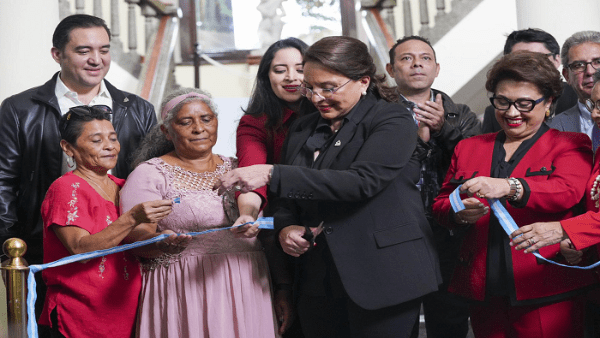
June 29 |
Honduran President Xiomara Castro inaugurated on Wednesday the Museum of Memory and Reconciliation in what used to be the Presidential House, located in downtown Tegucigalpa, 14 years after the coup d’état perpetrated against former President José Manuel Zelaya Rosales in 2009.
Castro stressed that the first act of his government was to approve the Law for the Reconstruction of the Constitutional Rule of Law and for the Events Not to Be Repeated, to condemn the coup d’état, compensate its victims and move towards reflection and historical memory.
“Today, with the opening of this Museum of Memory and Reconciliation, we create a space for reflection, a space for learning, a place to meet, to listen to the silenced voices and reconstruct the fundamental values of the creation of our Homeland. Building memory and reconciliation is a complex task,” he stressed.
The Head of State informed that the Secretariat of Human Rights formulated the project to establish the National Day of Truth, Memory and Justice, in addition to the approval of an Executive Decree through which the State assumes the responsibility to support the victims of the unconstitutional coup and their families.
“To those who with their sacrifice taught us that the liberation of our Homeland is not a gift, but a right that we must defend with all our strength, we are here to tell you that your names will remain engraved in the collective memory as a symbol of courage and resistance,” he recalled.
According to the Government Press Secretariat, the president joined the audience attending the evening to chant the names of the heroic men and women who gave their lives to oppose the breaking of the constitutional order, such as Isy Obed Murillo, Roger Vallejo, Wendy Ávila and others.
“Compatriots: together we can build the great Homeland, the dream of Morazán, of Bolívar, of Martí. Honduras today opens its fraternal arms to the solid altar of justice and democratic socialism that only on the basis of a fair and inclusive system can we build”, concluded the head of state.
The event was attended by former President Manuel Zelaya, the President of the Supreme Court of Justice, Rebeca Raquel Obando; the former President of Ecuador, Rafael Correa, members of the National Congress and international guests who accompanied the people of Honduras during the 2009 coup.
Central America
Washington Imposes Visa Ban on La Modelo Director Amid Crackdown in Nicaragua

The United States government announced Wednesday that it has imposed visa restrictions on Roberto Clemente Guevara Gómez, director of Nicaragua’s largest prison, La Modelo, for his involvement in actions that violate human rights.
In a statement, U.S. Secretary of State Marco Rubio said the measure is intended to promote accountability for abuses committed under what he described as the “Murillo-Ortega dictatorship” against political prisoners.
Rubio specified that Guevara Gómez was designated for participating in “a gross violation of the human rights of a political prisoner.” The sanction was issued under the 2024 Department of State, Foreign Operations, and Related Programs Appropriations Act, which bars the sanctioned individual — and potentially immediate family members — from entering the United States.
“United States demands the immediate and unconditional release of all political prisoners unjustly detained in Nicaragua,” the statement added.
Ongoing tensions between Washington and Managua
Washington rejected Nicaragua’s November 2021 elections, in which President Daniel Ortega and his wife, now co-president Rosario Murillo, were reelected while seven potential challengers were in prison.
Relations between the two countries remain tense amid expanding U.S. sanctions and increasing diplomatic pressure on the Nicaraguan government.
On January 10, marking Ortega’s 19 years in power, Nicaragua released “dozens of detainees,” including political prisoners. The move came one day after the U.S. Embassy in Managua stated that “more than 60 people” remain “unjustly detained or disappeared” in the Central American nation.
U.S. officials have continued to push for the “unconditional release” of political prisoners rather than selective or temporary releases.
Ortega, 80, governs alongside Murillo with consolidated authority, having strengthened executive power through constitutional reforms and security measures, while the opposition has been weakened by imprisonment, exile, and the revocation of citizenship and property rights.
Central America
Guatemala’s Attorney General Consuelo Porras Loses Bid for Constitutional Court Seat

Guatemala’s attorney general, Consuelo Porras, who has been sanctioned by the United States over corruption allegations, lost a key vote on Monday in which a public university selected two of the 10 magistrates for the country’s highest constitutional court. However, she could still seek a seat through another nominating body.
The election of five full magistrates and five alternates to the Corte de Constitucionalidad (CC) is taking place gradually over more than two months and is considered crucial in the ongoing struggle for control of Guatemala’s judiciary, which critics say has long been influenced by a political and economic elite accused of corruption.
According to results announced at a press conference, the governing council of the Universidad de San Carlos de Guatemala (USAC) rejected Porras, who had applied as either a full or alternate magistrate, and instead chose two candidates aligned with the university rector. The vote was held at a hotel in Antigua, about 35 kilometers from the capital.
Despite the setback, Porras — whose term as attorney general ends on May 16 — could still be nominated to the Constitutional Court by the Corte Suprema de Justicia, which appoints two magistrates. The remaining six are selected by the president, the bar association and Congress.
“It’s always a possibility,” the 72-year-old lawyer said days earlier when asked by reporters whether she would seek nomination through another institution if she lost the USAC vote.
Porras has been sanctioned by Washington and the European Union for allegedly attempting two years ago to block the inauguration of President Bernardo Arévalo and for pursuing legal actions against anti-corruption prosecutors, judges, journalists and social leaders since taking office in 2018.
The USAC vote was controversial because most members of the university’s governing council are serving beyond the expiration of their terms. Students, academics and social activists staged protests against Porras’ candidacy.
Central America
Teens visit ETESAL substation to learn about responsible energy use

Within the framework of World Energy Day, teenagers from the institutional care center Ciudad Niñez y Adolescencia (CNA), run by the Consejo Nacional de la Primera Infancia, Niñez y Adolescencia (Conapina), took part in an educational visit to a substation operated by Empresa Transmisora de El Salvador (ETESAL) in Santa Ana.
The aim of the activity was to give participants first-hand knowledge of how the country’s electricity transmission system works and to highlight the importance of responsible energy use.
During the tour, the group learned about the process that delivers electricity to homes, businesses, and industries. They were also introduced to specialized technical equipment and the safety measures required to ensure an efficient and reliable service.
Before the guided visit, the teenagers attended two informative talks and an environmental awareness session focused on the relevance of responsible energy consumption and its impact on the environment.
According to Nelson Menjívar, head of Conapina’s programs unit, the initiative serves a dual purpose. “It has two objectives: a recreational component and an educational one, so that adolescents can learn about the work carried out by ETESAL and how some of the resources they use at home are generated. This is in keeping with the guarantees established under the Crecer Juntos law; we ensure those rights for children,” he said.
Menjívar stressed that these activities help young people better understand how essential services function in their daily lives while promoting efficient consumption habits and a culture of environmental respect and care.
The event is part of the principle of shared responsibility set out in the Crecer Juntos law, promoted by the administration of Nayib Bukele, which states that families, society, private companies, and the State must work together to safeguard the comprehensive well-being of children and adolescents.
-

 International3 days ago
International3 days agoFamily of “El Mencho” Seeks Return of Body After Deadly Military Operation
-

 International3 days ago
International3 days agoLarry Summers Steps Down from Harvard Role Amid Epstein Controversy
-

 International3 days ago
International3 days agoIran’s President Optimistic Ahead of Geneva Nuclear Talks with U.S.
-

 International3 days ago
International3 days agoBill Gates Admits “Serious Mistake” Over Epstein Ties
-

 International3 days ago
International3 days agoStephen Hawking Photo Appears in Newly Released Epstein Documents
-

 International5 days ago
International5 days agoOver 40 Million Affected by Major Snowstorm in Northeastern U.S.
-

 International1 day ago
International1 day agoCocaine Production Surges 34% in 2023 as Market Expands into Africa and Asia
-

 International5 days ago
International5 days agoNine People Killed in Two Armed Attacks in Manabí, Ecuador
-

 International1 day ago
International1 day agoFederal Judge Blocks Trump Policy Allowing Deportations to Third Countries
-

 International1 day ago
International1 day agoClinton Accuses Republican Committee of Using Epstein Case to Shield Trump
-

 International10 hours ago
International10 hours agoArgentina’s Senate Reviews Milei-Backed Labor Overhaul
-

 International10 hours ago
International10 hours agoTrump Floats “Friendly Takeover” of Cuba Amid Rising Tensions





























